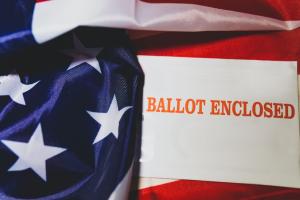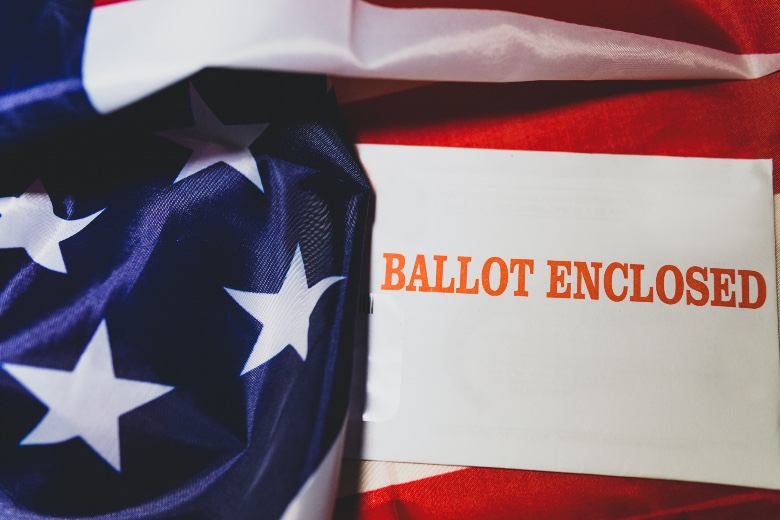
Politicians talk about faith more today than probably ever before. But should politicians be guided by their faith?
Election Day Is Coming!
Tuesday November 7 is Election Day across the United States. In some places, like Michigan (where I live), the only elections on the ballot are local. We have some ballot initiatives and some local offices to fill. These types of elections don’t normally “move the needle” in terms of public interest. But as soon as these elections are over, attention will turn to the 2024 election – even more than it already has. A Presidential election, with all 435 members of the House of Representatives, and 33 senators on the national level. Many statewide offices across the country will be up for grabs. And, as has been the case for the last several elections, the issue of religious faith will be front and center.
I moved to Northern Michigan in 1999. During the summer of 2000, a local newspaper reporter (remember those?) stopped by my office unannounced to talk to me. She wanted to discuss the issue of “politics and religion,” so I invited her in. She began with this comment: “It seems as though the candidates in this presidential election are talking about religion and their faith more than I remember in previous years.” I agreed with her assessment. So she asked this question: “Why do you think that is?”
My answer was simple: “Because they think it will get them votes.” And make no mistake: that is still why politicians talk about their faith. That memory, and the current state of our political system and discourse, lead me to some other questions:
Why should we be surprised that some politicians have religious faith?
Why do we expect politicians to dissociate themselves from their faith?
Should Politicians Be Guided by Their Faith?
Sadly, I think that people are surprised that politicians have religious faith because they don’t have any real connection with anyone who has “meaningful” faith. For most people, I fear, “faith” is something that is optional, and certainly not something that dramatically impacts “real life.” If you view faith as something that some people choose to do on Sunday (or some other day), you probably don’t understand why it should influence their decisions and actions during the rest of the week. But faith isn’t “real” if it doesn’t impact all of our lives. Is there any faith that doesn’t expect those who follow it to be influenced by what they believe?
If we understand what “faith” is, we shouldn’t be surprised that people who believe are impacted by their faith. So either we don’t understand what “faith” is (a possibility), or we don’t really know any people who have that kind of faith (also a possibility, but a much sadder one).
A Biblical Perspective
Speaking from the perspective of Christian faith, the Bible makes it clear that “faith” in Christ calls a person to a completely different kind of life:
“This means that anyone who belongs to Christ has become a new person. The old life is gone; a new life has begun!” (2 Corinthians 5:17)
“What good is it, dear brothers and sisters, if you say you have faith but don’t show it by your actions? Can that kind of faith save anyone?” (James 2:14)
“Not everyone who calls out to me, ‘Lord! Lord!’ will enter the Kingdom of Heaven. Only those who actually do the will of my Father in heaven will enter.” (Matthew 7:21)
Now, none of this is intended to invite people to assess others and their faith. I only point these things out to show that if we truly believe in Christ, it changes who we are and what we do. And it is impossible for those who are believers to set their faith aside for some other purpose.
In fact, if someone is a follower of Jesus, yet claims to not allow their faith to influence their work, their opinions, or their politics – whatever those may be – I would be less inclined to trust them than I would someone who made no claim of faith. Belief in Christ changes us to the core of our being; we cannot just set that aside! And I would assume that members of other faiths feel just as strongly about their beliefs.
Politicians Should Be Guided by Their Faith!
I think politicians should talk about their religious faith – if it is important to them. I certainly don’t want politicians who pander to people of faith by saying the right buzzwords, only to abandon their “beliefs” when they get elected. In my view, integrity is much more important in our political leaders than particular religious beliefs. I’m not interested in “litmus tests”; I’m interested in character. (I’m planning to address the subject of character in political leaders in a future post.)
The second question that I listed above is, “Why do we expect politicians to dissociate themselves from their faith?” I’ll answer that more fully in my next post, dealing with “Separation of Church and State.” I think that “separation of Church and State” is the reason that people expect politicians to keep their faith to themselves; however, as I’ll discuss in my next post, I think that most people greatly misunderstand what “separation of Church and State” really means.
To sum up: I don’t want any politician to ignore, cover up, or downplay their faith, no matter what it is. I want to know what they believe, and how it influences them. Then I can decide whether I think they will be a good public official based on all of their qualifications. I don’t want them to tell me that their faith isn’t important enough to influence them. I certainly don’t want them to tell me that if their faith does influence them! And I think faith is such an important part of our lives that I want to know

















Post comments (0)